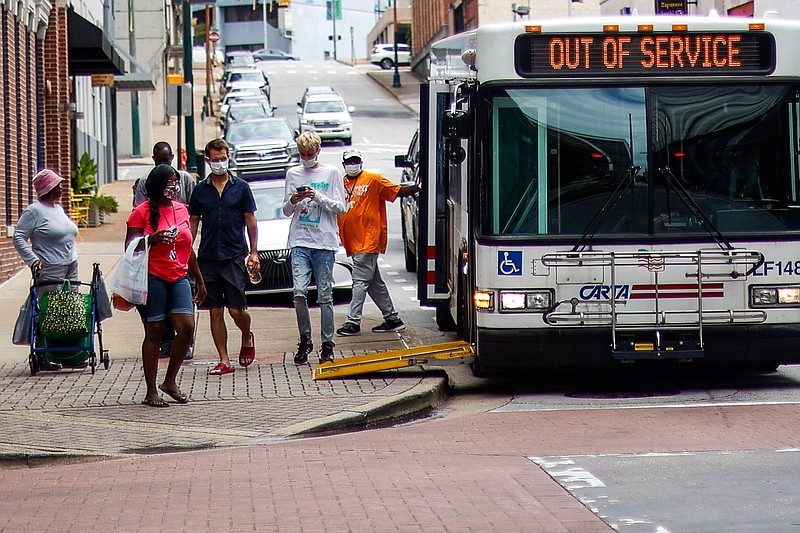Chalk up Chattanooga's bus service as the latest victim of COVID hangover.
For the first time since the coronavirus pandemic arrived in full in the spring of 2020, the Chattanooga Area Regional Transportation Authority (CARTA) has begun charging passengers to ride the bus.
But some people are saying it's too soon or that it's unfair to charge the homeless or people who can't afford the $1.50 one-way fare, or that it ought to be free.
It's no different from those who don't want to see an end to federal virus-related eviction moratoriums, rental assistance, tax credits and stimulus payments.
When people become used to not paying for something, or getting something they didn't work for, it is a habit few ever want to give up.
Complicating the process is the campaign promise this spring by then-mayoral candidate Tim Kelly to make CARTA fare-free.
"Chattanooga will create a plan to eliminate fares for main bus routes and provide free transportation to city residents by 2022 by increasing non-fare revenue, which will rise with increased ridership," Kelly said in extensive list of vows on his website.
It's a promise, chief policy officer Joda Thongnopnua told the Times Free Press last week, the administration still plans to keep.
"Over the coming weeks and months ahead, it is our intention to find a sustainable path to fare-free," he said.
The reason CARTA went back to charging, CARTA director Lisa Maragnano told the paper, was to protect drivers and passengers after a rash of health and behavioral issues on buses, which still run on limited capacity due to COVID-19.
She said the people who really need to use the bus service for transportation weren't able to get on "because folks were just riding to ride, to get out of the weather or, you know, have air conditioning, that kind of thing."
She went on to describe episodes where urine and feces were left on buses and how some of the freebie riders didn't want to get off at the end of the line.
"We would have to bring the bus back in and have it cleaned, obviously," she said, "and that takes that vehicle out of service, and then you have to get somebody else to swap that vehicle out. So that was a really big issue. And a lot of it was some behavioral issues. The driver would ask them to get off the bus because they've already had their trip around. They will refuse to get off, and then they would become belligerent, so we end up having to call CPD [the Chattanooga Police Department] and try to deal with that."
The CARTA board, hearing from passengers who weren't able to board and learning of its stressed drivers, voted to restore the $1.50 fares without any passes or discounts.
If the Kelly administration eventually wants the bus service to be free, though, we wonder 1) how it will distinguish who can ride from who cannot if limited capacity continues because of COVID-19, and 2) how it will prevent the abhorrent behavior from some of the passengers.
Another small matter is how to pay for such a service. CARTA is no different from public transportation everywhere in that it doesn't and won't ever pay for itself.
During the mayoral campaign, it was reported bus fares account for only about 11% of the transportation system's operating budget. The rest, according to the authority's financial statements, comes from federal, state and local operating subsidies and federal, state and local planning grants.
CARTA also operates the Lookout Mountain Incline, the free Downtown Electric Shuttle and the government-owned downtown parking system that includes three parking garages.
During the campaign, candidate Monty Bruell suggested raising parking fees 50% at the downtown garages, increasing parking meter fees, jacking up parking ticket fines and creating an electric water taxi on the Tennessee River.
Whatever Kelly and Thongnopnua have in mind - however they'd make up the 11% of the budget the fares once covered - they aren't saying. But Thongnopnua does make a good point in saying the city wouldn't want to go back and forth on fees - take them away, then reinstitute them, then take them away. He said the plan must be sustainable.
And that's only considering the routes the system currently serves.
Kelly said during the campaign, and since, that bus service also needs to be worked out, or at least better coordinated, to help get more students to the schools housing the Future Ready Institute in which they are most interested. Such transportation was promised to be just around the corner when the institutes were announced several years ago.
Times Free Press archives show about 1% of Chattanoogans take CARTA to work and about 1% of commuters over the age of 16 in general use public transportation.
Making the bus service free is not likely to significantly increase the ridership of those who have their own cars, may drive away passengers if a way is not found to manage the joyriders and may become even less sustainable if the White House is again occupied by someone not so free with other people's money.
Some riders may buck at being asked to pay the nominal fee now, but that'll be nothing compared to expectations and headaches if bus service is free.
